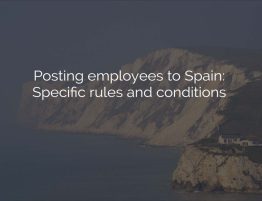
B ecome a Spanish tax resident while continue paying taxes as a non-resident.
For those natural persons relocating to Spain for employment purposes, there is a very interesting and potentially beneficial tax scheme known as “The Beckham Law” which offers the possibility of becoming a Spanish tax resident while continue paying taxes as a non-resident.
This special tax scheme is regulated in the article 93 of the Spanish Personal Income Tax Law (Ley 35/2006 IRPF) and is commonly referred to as “The Beckham Law“, as David Beckham was one of the first persons to benefit from this scheme upon his signing for the football team of Real Madrid in 2005.
The scheme, although being used by footballers back in the day, was passed to attract talent to Spain and applies to ex-pats who want to benefit from a huge incentive in their personal income tax.
The Beckham Law tax scheme
What are the advantages of this scheme?
- Obtain Spanish residency to all purposes;
- Flat 24% tax rate for wages earned over the first six years up to 600,000.-€/year;
- Dividends and earnings obtained abroad are not taxed in Spain;
- No need to file other declarations that are mandatory for Spanish tax residents such as the Modelo 720;
- A huge incentive for natural persons as well as for foreign companies relocating employees to Spain.
As seen above the advantages of the Beckham Law scheme are important and the requirements to qualify for this special tax scheme are fairly standard, find out the requirements in our FAQs section.
To put this into perspective and see what the real advantages to this tax scheme are let’s see a couple of real case examples:
From a taxpayer perspective
Paul works as a business developer for a major IT company in Germany since 2015. After been doing some research in the market and job interviews he has accepted a job position in the Barcelona office of one of the leading start-ups in Spain, the job offer includes a salary of 85k€ a year and housing allowances provided by the company.
Paul owns one property in Germany that he will be renting while he is relocated to Spain.
What is the tax amount Paul will be paying under the Beckham Law scheme?
| Earnings in Spain
All earnings made in Spain from employment wages will be taxed on a flat 24% basis, which includes monetary payments and in-kind (house allowances). |
Earnings overseas (flat rent)
Under the Beckham Law tax scheme, Paul will only be taxed for his earnings in Spain. Any earning generated overseas will be taxed abroad; therefore he will not be required to declare in Spain any earnings made from his assets in Germany, including of course rents obtained by his property in Germany. |
Now let’s see another example but from a foreign company perspective and with regards to its relocated employees.
From a foreign company point of view
The company British Engineering Ltd., based in the UK, is one of the top firms in its sector with more than 50 years of existence. As part of a massive engineering work taking place on the Mediterranean coast of Spain, it is been offered taking take care of the construction of one of the legs of the project for which they would need to either hire engineers to Spain or relocate personnel from the parent company.
The program has an estimated duration of three years and requires 30 engineers working on-site (Spain) full time. The company finds it interesting to set up a subsidiary company in Spain and relocate some contractors under the Beckham Law scheme.
What would be the advantages available to the company and the contractors relocated to Spain?
To the company
|
To the relocated contractors
|
As can be seen, the Beckham Law tax scheme is a very attractive option, not only for individuals but for foreign companies as well when it comes to relocating people to Spain.
Ask our English-speaking corporate lawyers and tax experts for further information on it by clicking on the contact link.










